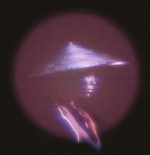Song of America
By Raoul Hernandez, 12:40PM, Thu. Dec. 27, 2007
I bought Quanah Parker at the Armadillo Christmas Bazaar.
Probably shouldn’t say how many greenbacks changed hands, but it was both more and less than you’d think. Pretty good deal for a Comanche bigwig:
“Born to Cynthia Parker, an abducted settler white woman, and Chief Noconas, the young warrior led the Kwahadi Comanche in treacherous attacks against ‘white’ intruders. After the surrender in 1875, Quanah became a shrewd, dynamic leader of the reservation. He died in 1911 and was buried next to his mother.”
Scoped him out during Ponty Bone & the Squeezetones’ glowing set on Sunday, and plunked down some Hamiltons towards the end of the Texana Dames typically miracle (and annual) Christmas Eve performance. He could be the brother of my Los Lonely Boys gold record hanging a few inches away. On the other side, a naked sprite clutching the candle of a tongue-shaped, Plexiglas Rolling Stones 45, “She Was Hot,” keeps Parker burning the midnight oil.
He hadn’t said a word until the recent, 3-CD Song of America opened with Earl Bullhead’s “Lakota Dream Song,” traditional. Leading off 50 numbers “from notable events that have shaped our nation’s history,” the American Indian chant instantly reminded me of the opening to piano great Don Pullen’s Blue Note swan song, Sacred Common Ground from 1995, the year the avant-gardist died. Primal incantations seeding jazz? Hymns Americana.
Nine years of ambition, Song of America umbrellas five categories: “United We Stand, Divided We Fall,” “War and Peace,” “Work,” “Families at Home and on the Move,” and “Faith and Ideals.” Neither as lively and lush as 2004’s Beautiful Dreamer – The Songs of Stephen Foster, which featured some of the same acts, nor as down-n-dirty as 2003’s Bloodshot Records hoof print, The Executions Last Songs Vol. 2-3, and going back more than a decade to 1996’s Rig Rock Deluxe, A Musical Salute to the American Truck Driver, it nevertheless deserves salute. Or scalping.
Disc one, “Red (1492-1860),” follows “Lakota Dream Song” with the crisp, Old World twang of “Once More Our God Vouchsafe to Shine” by Julie Lee and her baritone ukulele, which evokes North America’s puritanical inquisition with chilling intent (“give the poor Indians the eyes to see the light of life and set them free”). Thankfully, the Blind Boys of Alabama immediately soothe any ruffled feathers with the a cappella gospel of “Let Us Break Bread Together.” The Robyn Hitchcock-leaning John Wesley Harding, aided by French horn, trumpet, and tuba, then subverts “God Save the King” with gentle, ear-digging dissonance. So far so good. Malcolm Holcombe’s dirt-eaten epic, “The Old Woman Taught Wisdom,” takes no prisoners. Unfortunately, neither does Nashville.
Halfway through “Red,” the preponderance of tracks recorded in Music City by native and interloping Tennesseans begins slopping on the mayonnaise. Casting nu soulsters Take 6 in “The Star Spangled Banner” would be inspired if they didn’t traffic in the same high fat content. Elizabeth Foster, BR549, Ed Peterson, Steven Kowalczyk, and particularly Beth Nielson Chapman’s soulless “Sometimes I Feel Like a Motherless Child” drain the proceedings of all blood until the Fisk Jubilee Singers baptize “Go Down Moses” and Thad Cockrell tows the Mavericks through a deliciously long and Southern Comfort reading of “Dixie Land.”
Marah kick-off the deuce disc true to its title, “White (1861-1945),” their sodden take on “John Brown’s Body” an affront to the band’s trademark Replacements-meet-Springsteen brand. First wave folk survivor Janis Ian hushes the atmosphere with an a cappella “Johnny I Hardly Knew You,” but she’s sandwiched by Wonder Bread until Jake Shimabukuro rolls a (track) seven on his solo ukulele rendition of John Philip Sousa’s “Stars & Stripes Forever.” Judith Edelman (“Sleep My Child”) and Jen Chapin (“Over There”) tag-team sweet and sweetner to good effect too. Usually stupendable Andrew Bird doubles his vox to the point of Band of Horses, no relief from the following Karen Parks' opera, “Lift Every Voice and Sing.” Graciously, Danielson delivers “Happy Days Are Here Again” prior to jazz great Andy Bey and his trio making at least three dozen of the set’s other guests looking poorer for “Brother, Can You Spare a Dime.” Hard for Old Crow Medicine Show to screw up Woody Guthrie’s “Deportee” and they don’t, nor does Folk Family Robison, which keeps it in the family with closing Guthrie/Pete Seeger banjo rattle “Reuben James.”
Last platter, “Blue (1946-present),” hues true simply on the half-century of Americana it represents. Devendra Banhart and the Del McCoury Band have only to stroll through their respective mellows, Weeds appropriation “Little Boxes” and Dylan’s “The Times They Are A Changin’” to please, but Kim Richey doesn’t do enough with 1960s Youngbloods anthem “Get Together.” Charles Walker & the Dynamites take a whack at James Brown’s “Say It Loud (I’m Black and I’m Proud),” but their studio attack isn’t nearly as loud as their live prowess. Ben “Son of James” Taylor on Neil Young’s “Ohio” and Anthony David with an assist from Motowners Jack Ashford and Bob Babbitt on Marvin Gaye’s “What’s Going On?”: wrong men for right songs. Martha Wainwright does what she can with Helen Reddy’s “I Am Woman,” but beleaguered Matthew Ryan doesn’t man up to Springsteen’s “Youngstown.”
Covering Grandmaster Flash’s “The Message” and Bettye LaVette feeling Springsteen’s “Streets of Philadelphia” infuse a dollop of melting pot, but the American Heritage Award goes to the project’s producers for the 46th Song of America, credited to Austin’s Alejandro Escovedo. Recorded in Slovenia with a choir, Escovedo acolyte Gary Heffern’s faithful air bubble through “Wave” should be considered AWOL from Por Vida, A Tribute to the Songs of Alejandro Escovedo. John Mellencamp, meanwhile, cocking it through closer “This Land is Your Land” probably looked good on parchment.
What about Beck doing War’s “Lowrider,” Mavis Staples covering “Bridge Over Troubled Waters,” or Steve Earle eating “American Pie”? (Alright, maybe not that last one.) Or, indeed, Don Pullen’s American spiritual, the 10-minute “Common Ground”? Quanah Parker digs Don Pullen.
A note to readers: Bold and uncensored, The Austin Chronicle has been Austin’s independent news source for over 40 years, expressing the community’s political and environmental concerns and supporting its active cultural scene. Now more than ever, we need your support to continue supplying Austin with independent, free press. If real news is important to you, please consider making a donation of $5, $10 or whatever you can afford, to help keep our journalism on stands.








